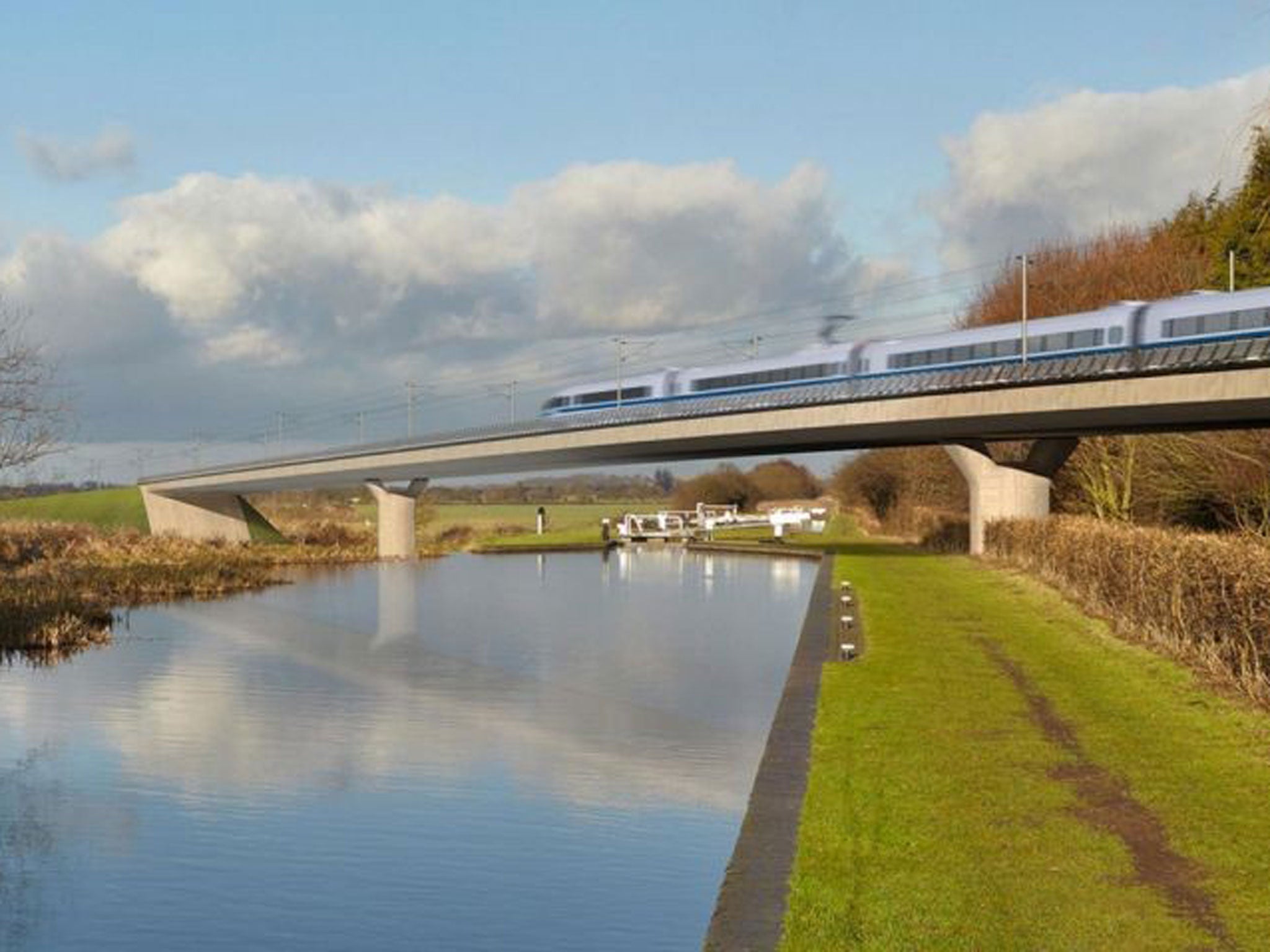Lawyers on the line: high-speed rail plan faces 10-year delay
Details unveiled of second phase of £32.7 billion project which government claims will create at least 100,000 jobs

Britain’s HS2 high-speed rail line could be delayed for a decade as a unified coalition of Conservative councils, MPs and environmental groups threaten disruptive legal action.
The new £33bn line is intended to kickstart the country’s economic recovery, but Department for Transport officials now fear work may not begin until 2022, amid a flood of court cases and judicial reviews, The Independent can disclose.
David Cameron today promised that HS2 would “spread the UK’s wealth” and give a “better balance to the UK economy” as the route of its Y-shaped second phase from Birmingham to Manchester and Leeds was unveiled.
But the Government is now facing a concerted revolt as northern local authorities and backbench MPs affected by the proposed line unite with campaigners opposed to its first phase from London to Birmingham.
Michael Fabricant, MP for Lichfield and Tory deputy chairman, warned that Chancellor George Osborne, will now “see the strength of public opinion for himself”, with the line due to pass through his Tatton constituency in Cheshire. He added: “Every MP along the route will have people lobbying him. The people of Cheshire, like the people of Staffordshire, don’t hesitate to make their views known – and quite right too.”
The Conservative MP for North-West Leicestershire, Andrew Bridgen, Transport Secretary Patrick McLoughlin today trumpeted the benefits of HS2, including increased North-South rail capacity, halving the current two hour eight minute journey time between and Manchester and London, the creation of 100,000 new jobs, and substantial investment boosts for major city centres,
Mr Cameron chaired a special gathering of the Cabinet in Leeds to discuss the plans, with ministers then fanning out across the region to make the case for the project.
Phase two running north from Birmingham along a total of 211 miles of new track will have stops and new stations at Manchester, Manchester Airport, Toton in the East Midlands, Sheffield and Leeds. Sheffield will miss out on a city-centre station with a new link built instead at Meadowhall. High-speed trains will also stop at Crewe’s existing station.
But a planned spur taking HS2 to Heathrow airport has been put on hold until after the Davies review of Britain’s hub airport and aviation policy is completed in 2015.
Constituencies bisected by the provisional route for the second phase are located in Cheshire, Staffordshire, Leicestershire, Nottinghamshire, the East Midlands and Yorkshire.
The government is due to finalise the precise route of HS2 next year in advance of legislation in 2015. Construction of the first phase is planned to start in 2017,.
However if a flood of judicial reviews and court actions over the legality of the consultation process delay planning authorisation, and ultimately require routes to be heavily redrafted, Whitehall officials fear that work could be pushed back to 2022.
This could also delay the start of work on the northern extension, which is due to begin in the middle of the next decade ahead of a planned opening in 2032-33.
The High Court is already considering whether the first phase of the project, which will take is legally flawed. The challenge was taken to the court by campaigners who accused the Government of failing to undertake a “strategic environmental assessment” or arrange an adequate consultation process.
The legal action focuses on the London-Birmingham route, however its outcome will have repercussions for the entire HS2 project.
Penny Gaines, chair of the StopHS2 pressure group, said she had already been contacted by constituents and local politicians in northern counties opposed to the provisional route of the second phase.
Ms Gaines said the gathering storm against HS2 was on course to produce “a strong alliance that included Conservative-run councils, MPs, activists from both the Green Party and UKIP, as well as a some Labour MPs and supporters who will take action to oppose this fundamentally flawed London-centric policy.”
Last week in the Commons, the Shadow Works and Pension Secretary, Liam Bryne, described HS2 plans for his Birmingham city-centre constituency as likely “not to last 10 minutes in court.” He described plans to tie up land for a marshalling yard as “a monstrous economic crime against the city.”
Councillors contacted by The Independent echoed Mr Byrne’s comments that the HS2 consultation process was flawed and would be legally challenged.
Councillor George Walton, a civil engineer and the mayor of Cheshire East, predicted there would be visible public outrage if the HS2 route was forced through “highly loved countryside” lying south of Manchester.
Simon Jenkins, the chairman of the National Trust, said: “It is not a sensible project. If you’re going to spend £33 billion on transport in this country you would not spend it on this train.”
In Nottingham, the local chair of the Campaign for Better Transport, David Thornhill, described the government’s plans as “environmentally catastrophic and wasteful”.
Professor Greg Marsden, director of the Institute for Transport Studies at Leeds University, said “It is hard to assess just what HS2 will achieve.” He said critics could rightly round on the lack of precision and detail on what it would deliver for its “ big ticket price.”
The Chancellor, George Osborne, predicted the investment would become the “the engine of growth” in the north of England and the Midlands.
Positive reaction to the plans included the TUC’s general secretary, Frances O’Grady, who said HS2 held the potential to be “ a game-changer for the economy ”.
The British Chambers of Commerce, and the Institute of Directors, both welcomed the provisional route and the government’s commitment to new investment.
Join our commenting forum
Join thought-provoking conversations, follow other Independent readers and see their replies
Comments